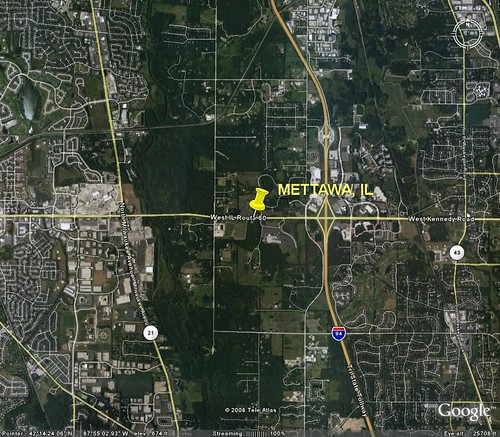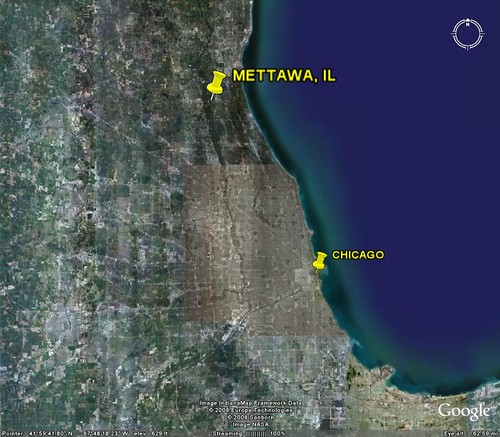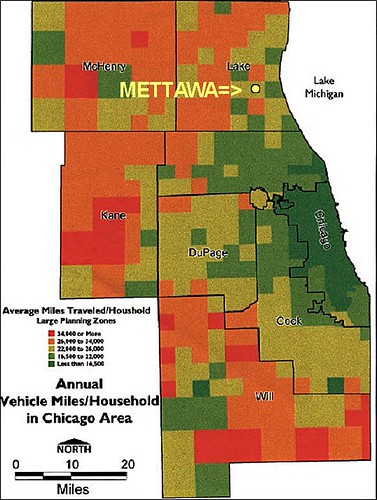What a joke: auto-dependent corporate HQ in sprawl claims to be “carbon neutral”

Posted July 5, 2008 at 1:42PM
According to a story in the New York Times:
“METTAWA, Ill. — HSBC, the giant London-based bank, has moved its North American headquarters to a sprawling facility that it bills as carbon neutral in this hamlet about 30 miles north of Chicago.
“The 560,000-square-foot building, a five-story, H-shaped structure, was developed for more than $100 million on 29 acres with easy access to Interstate 94, between Chicago and Milwaukee . . ."
God, where to start. What we really have here is yet another high-tech building calling itself “green” but that warrants the label only if you completely discount the sprawling, totally automobile-dependent location. Research proves that buildings in sprawling locations cause far more carbon emissions from employees and visitors driving to and from them than they save with energy-efficient building technology.
In this particular case, not only does putting a single building on a 29-acre site waste land and guarantee that nothing is or ever will be within walking distance beyond the HSBC campus (as it turns out, there’s no walkable infrastructure or logical walking destinations nearby anyway). But the new building is also located in a place that, notwithstanding (or perhaps because of) the “easy access to Interstate 94,” is known to generate high rates of driving. I suppose I don’t have to add, but will, that there is no public transit access.
The Times article says the company scouted over 50 sites in greater Chicago. If so, it must have consciously passed over many that would have made for a much more environmentally benign result.
Let’s look at some maps. Here’s Mettawa, as we can see a location with very little existing infrastructure:

And here it is in relation to the rest of the Chicago region:

And, finally, here it is on a map delineating the amount of vehicle miles traveled per household in the Chicago region. All the areas in green, especially those in dark green, drive significantly less than those in tan or red, and represent potentially better location choices for a major employment center such as HSBC:

Note that Lake County, which contains Mettawa, is mostly red. That means that even the company’s employees who choose to live close to work will rack up big miles in their non-commuting driving (a majority of miles driven in the average household), because everything else in the region is at a greater distance than it would be for a more central location or one placed within a highly developed suburb. Heck, the map suggests that just moving a few miles east to Lake Forest would have helped.
I wouldn't necessarily say that Mettawa shouldn't be developed at all, by the way. That depends on what its citizens think, whether development there could attract transit, and all sorts of other things. But, if it is to be developed at some point, it would be so much better if it were developed as an actual town, with, you know, streets and stuff. Shops and amenities that residents could walk to. Not a corporate behemoth on an isolated private reserve. This is Lake County, north of Chicago, not 17th century France.
Now, to be fair, I will grant that the building contains or facilitates all sorts of cool eco-friendly features, according to the Times story:
“These include collecting roof water for flushing toilets; using Prairie-style, drought-resistant landscaping to reduce the need for watering; and relying on light-guided window treatments, which track the sun’s position to trim the need for heating and air-conditioning.
"In addition, parts of the roof are planted with vegetation, and all of the electricity used in the building is bought from renewable or non-carbon-emitting resources, including wind farms.”
But the fact that the bank anticipates earning a LEED-gold certification from the US Green Building Council for these features in spite of its deceptively heavy carbon footprint only points out the need for much, much tougher location criteria in the LEED rating system. USGBC should not be encouraging this stuff. We’re working on it, but we have a long way to go.
I wasn’t planning to work this weekend, but someone emailed me this story. Thanks a lot, John. ;)